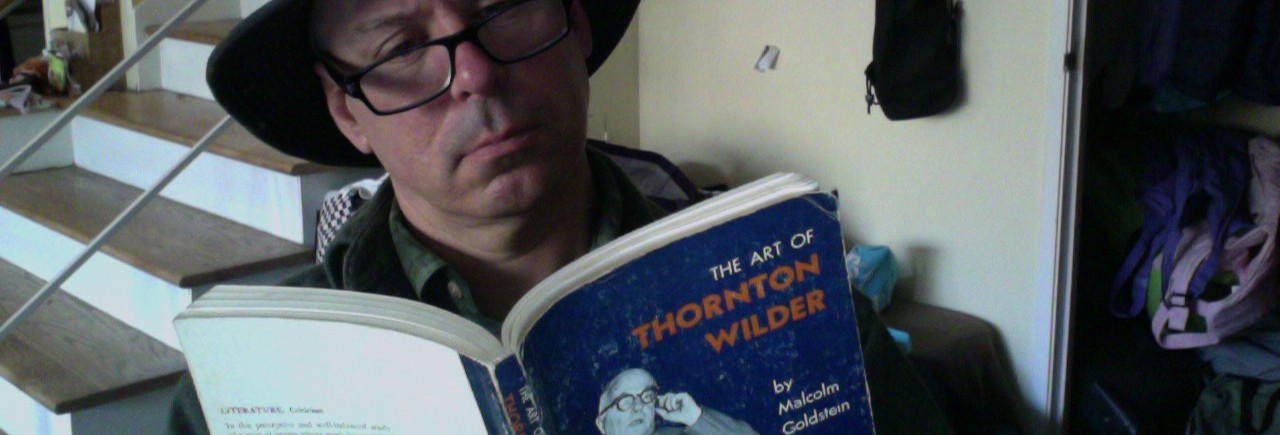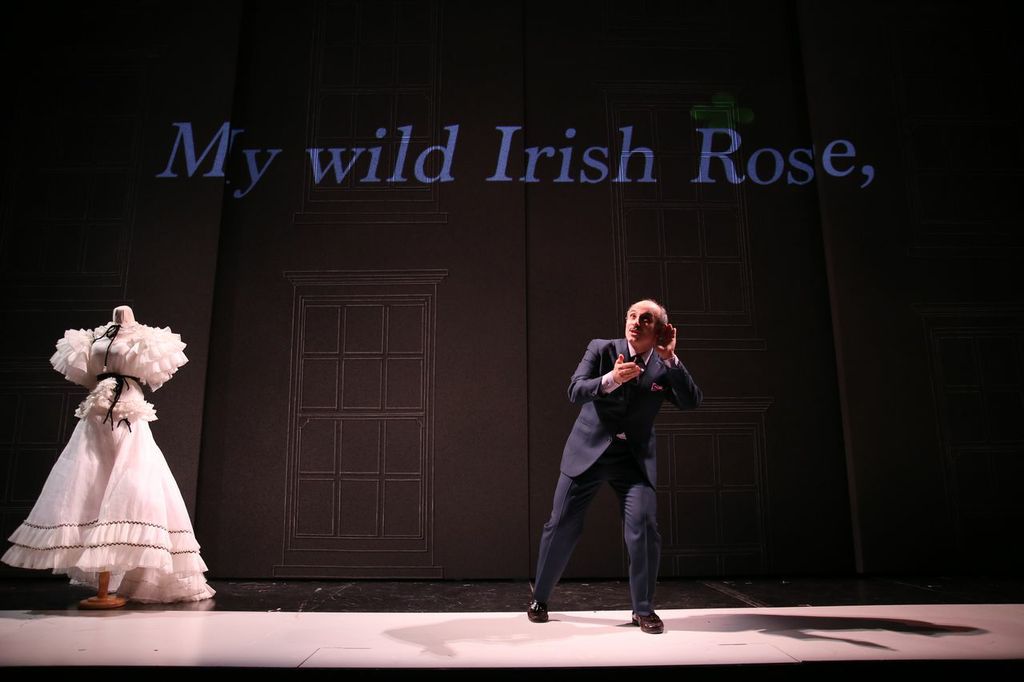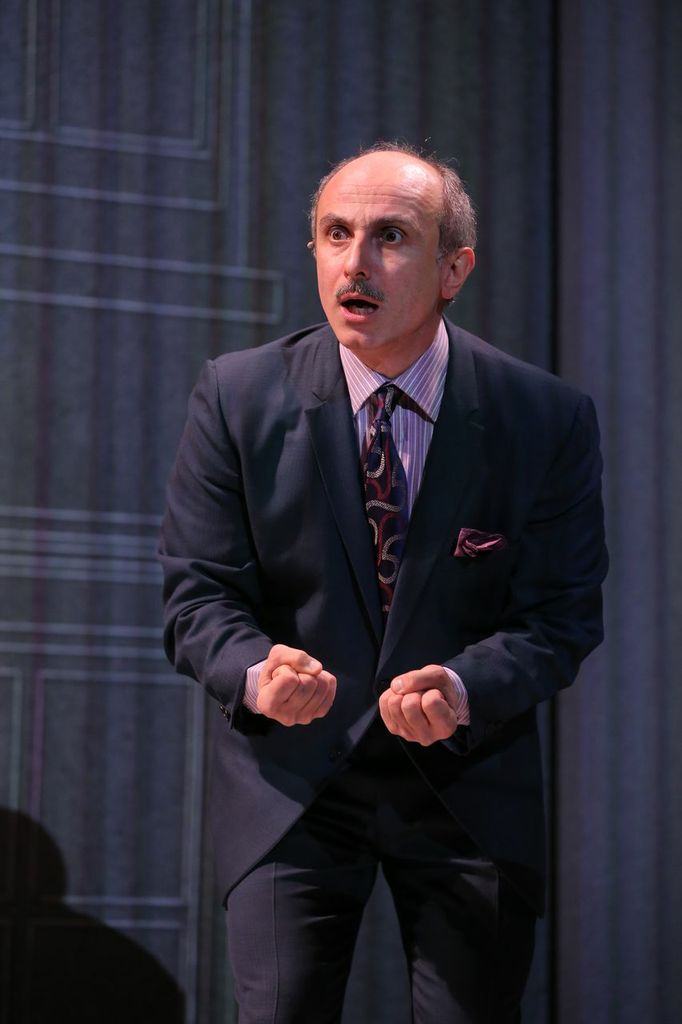“It’s like coming home. It’s so fantastic. I forgot how much I loved Yale!”
I had lunch last Wednesday with an actor I greatly admire, Stephen DeRosa, who’s in town as part of the large cast of These Paper Bullets! (at the Yale Rep through April 5). We’d met once or twice briefly in the distant past, and I’d interviewed him by phone a few years ago when he was playing the token grown-up in the national tour of the most recent Broadway West Side Story revival. But this lunch was the longest encounter I’d had with DeRosa ever.
The last time DeRosa and I had spoken, he was receiving acclaim for his impersonation of Eddie Cantor on the first episode of Boardwalk Empire (the season pilot, directed by Martin Scorsese). But at that point, he had no inkling of whether he’d be asked to reprise the role. Since then, he’s appeared as Cantor a half dozen more times. Last year, DeRosa was in the Broadway productions of Douglas Carter Beane’s The Nance (understudying Nathan Lane) and Harold Pinter’s Betrayal (directed by Mike Nichols).
He attended Yale as both an undergrad and in the acting program of the School of Drama. After graduation, he scored a New York hit alongside Everett Quinton in an important revival of Charles Ludlam’s The Mystery of Irma Vep. He hasn’t done a Yale Rep show since his graduation year. That was a Shakespeare too—he was Feste in Twelfth Night, directed by Mark Rucker. Among the many other Yale shows he did, DeRosa was in a production of Chekhov’s Three Sisters, the thesis project for directing student James Bundy, who since 2002 has been Dean of the School of Drama and Artistic Director of the Yale Rep.
What I wanted to discuss with DeRosa was very present-tense: how a certain transitional scene in These Paper Bullets had developed from a quick walk across the stage with a dressmaker’s dummy to a show-stopping fourth-wall breaking quip, an audience sing-along and more.
“You won’t be surprised to hear that came out of tech rehearsals. All I was going to do was bring on the wedding dress of my dead wife. We get to the tech rehearsal and learn that the set change will be one and a half minutes long. So Rolin [Jones, the playwright] suggests that I sing a little bit of ‘My Wild Irish Rose.’ Then they still needed more time, so Rolin wrote me a little monologue.
“While I was performing that monologue, one of the jokes wasn’t landing, so I said, ‘How’s that transition going?!’
“Jackson [Gay, These Paper Bullets’ director] liked it, and suggested we keep it. We fixed the line so the audience would get it: ‘How’s that scene change going?’
“But all along, we’d thought about doing a sing-along. We had the projection guy do lyrics and a bouncing shamrock.
“The whole bit became two and a half minutes!
“Now, if the show were to be done in another production, with another set, of course it would be one of the first things cut. But here, it gave the crew sanity and comfort to work back there.”
DeRosa graduated from the Yale School of Drama in the early 1990s. “I haven’t been back in 20 years,” he says, “though half of my career has been in the regional theater. I’ve worked with great people in great places. This was one such opportunity, refreshingly close to home. While 13 of the 19 cast members of These Paper Bullets are YSD alumni, and many have worked together before, DeRosa got picked not through the Yale network but as the result of a good old-fashioned audition.
DeRosa loves his character—Leonato, Hero’s father, from Much Ado About Nothing rethought as London hotelier who hides his Irish upbringing behind an upper-class European façade. DeRosa’s a consummate supporting cast member, sharing scenes rather than upstaging others for no reason. That’s why it’s wonderful to see him get his two-and-a-half crowdpleasing solo, just as it was nice to see him get a song-and-softshoe bit as another caring dad, Wilson Turnblad, in the original Broadway production of Hairspray.
“I’m a character guy,” DeRosa says. “I’m a supporting guy. You shouldn’t take a part to overshadow everybody else. You take a part because it’s your part, and it should be outstanding on its own terms. The best way to tell a story is to let every moment shine. The show is the thing that should stand out.”


